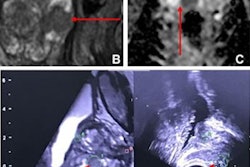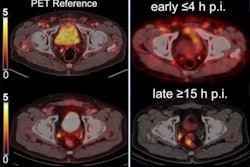Researchers from University College London have found that MRI screening has a major impact on prostate cancer diagnosis. They unveiled their results in an article published on 21 August in BMJ Oncology.
MRI detects prostate cancer in men who have prostate specific antigen (PSA) density levels below the follow-up benchmark of 3ng/ml, lead investigator Prof. Caroline Moore, a professor of urology, said in a statement released by the university.
"The thought that over half the men with clinically significant cancer had a PSA of less than 3 ng/ml and would have been reassured that they didn't have cancer by a PSA test alone is a sobering one and reiterates the need to consider a new approach to prostate cancer screening," she noted.
Typically, men are screened for prostate cancer with a PSA test and a rectal exam, followed by biopsy if disease is suspected, the team wrote. This approach has been shown to reduce mortality from the disease by 20%, but it has also been associated with overdiagnosis and overtreatment of low-risk cancers. That's where MRI could help: Research has shown that using the modality to assess men who are at higher risk of prostate cancer reduces unnecessary biopsies, Moore and colleagues explained.
"In recent years, the introduction of MRI as a first step in investigating men at higher risk of prostate cancer has spared one in four men from an unnecessary biopsy, which is invasive and can lead to complications," the university statement continued.
The trial, called ReIMAGINE, is the first to use MRI scans to assess PSA density -- and thus determine if further testing is needed, according to the statement. The investigators included data from 303 men between the ages of 50 and 75 who upon invitation to screening underwent both an MRI exam and a PSA test.
Of these men, 16% had a positive screening MRI exam that suggested prostate cancer, even though they had median PSA density results of 1.2 ng/ml, a score that suggests that further testing for the disease isn't necessary. (PSA levels above 3 ng/ml prompt additional diagnostic measures such as biopsy.) In fact, 32 of the 303 men had PSA levels lower than 3 ng/ml, "meaning they would not have been referred for further investigation by the PSA test currently in use," the group noted.
The team also found that 29 patients had prostate cancer that required treatment, and of these, 15 had a PSA score below 3 ng/ml.
"Our results give an early indication that MRI could offer a more reliable method of detecting potentially serious cancers early, with the added benefit that less than one per cent of participants were 'over-diagnosed' with low-risk disease," Moore said.
The researchers hope the study findings will support development of a prostate cancer screening program in the U.K., according to senior author Prof. Mark Emberton, a professor of interventional oncology at University College London.
"The U.K. prostate cancer mortality rate is twice as high as in countries like the U.S. or Spain because our levels of testing are much lower than other countries," he said. "Given how treatable prostate cancer is when caught early, I'm confident that a national screening program will reduce the U.K.'s prostate cancer mortality rate significantly."
The complete study can be found here.



















